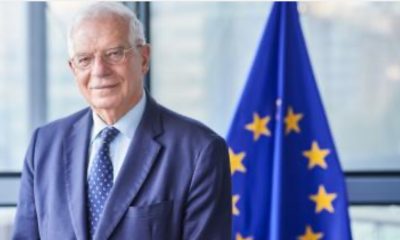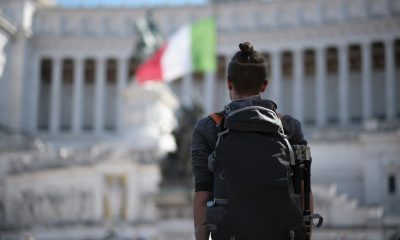EU
UN expert calls on Europe to bank on migrants’ mobility to regain control of its borders

 “The European Union must bank on mobility in order to regain control over its borders,” the United Nations Special Rapporteur on the human rights of migrants, François Crépeau (pictured), said today (5 February).
“The European Union must bank on mobility in order to regain control over its borders,” the United Nations Special Rapporteur on the human rights of migrants, François Crépeau (pictured), said today (5 February).
“The status quo isn’t sustainable,” Crépeau warned at the end of an official visit to Brussels, the third and final component of his follow-up study on the management of the EU external borders launched in 2012. “By continuing to invest financial and human resources mostly on securing its borders, Europe will certainly continue to lose control of its borders.”
“Banking on mobility means that the overall goal is to have migrants using official channels to enter and stay in Europe,” he said. “For that, EU Member States must accept that migrants will continue to come, no matter what, and offer them incentives to use regular channels, because these will respond to their needs, as well as to the economic and social needs of Europe.”
Migrants and asylum seekers move due to the push factors in their countries of origin, which may include war, conflict, natural disasters, persecution or extreme poverty, as well as in response to pull factors such as the unrecognized needs in the labour markets of EU Member States. “These push and pull factors are unlikely to change in the foreseeable future,” the expert said.
It is currently estimated that in 2014 more than 150,000 migrants and asylum seekers arrived in Europe by sea, compared with 80,000 in 2013.
The Special Rapporteur noted that Syrians, for example, cannot be expected by the EU to live in Lebanon and Turkey indefinitely, with some having no viable prospects for a better life for themselves or their families while the EU stalls in making a commitment to a meaningful refugee resettlement programme. “If nothing else is available to them, they will take their chances with smugglers in order to provide a future for themselves and their children, as many of us would do in similar circumstances,” he said.
“Any attempt at sealing borders – as the nationalist populist discourse stridently calls for – will continue to fail on a massive scale,” Crépeau underscored. “Sealing international borders is impossible. Migrants will continue arriving despite all efforts to stop them, at a terrible cost in lives and suffering if nothing else is put in place. Italy recognized this and as a result has launched the Mare Nostrum search and rescue operation for which it must be commended.”
“Europe is grappling with how best to respond to irregular migration movements and to satisfy its immigration needs despite a toxic political environment. There are signs that it is slowly moving in the right direction,” he said, noting several initiatives by the EU and individual governments. The initiatives include the “Blue Card” system, the Seasonal Workers Directive; the draft student and researchers policy; the proposal for a holistic approach to migration from the European Parliament; the prioritisation of migration in the strategic framework and work plan for human rights and democracy promoted by the EU High Representative for Foreign Affairs and Security Policy and Vice-President of the European Commission, Ms. Federica Mogherini; and the Frontex Triton search and rescue operation which has already rescued 17.000 migrants.
“All these initiatives must translate into effective programmes that work for both Member States and for migrants and asylum seekers – whose human rights must be fully protected at all times,” he stressed.
To avoid asylum seekers having to take to dangerous land and sea routes, European States, in partnership with other Global North States, should implement an important refugee resettlement programme, over a number of years, with a distribution key for attributing responsibilities. The EU Commissioner for Migration, Home Affairs and Citizenship, Avramopoulos has already called for a similar proposal and initiatives such as those of Sweden, Germany and Austria are leading the way.
The expert also called on Europe not “to turn a blind eye to the pull factors for irregular migration,” such as the unrecognized needs for migrant workers in European underground labour markets. “EU Member States should recognize their real labour needs, including for low-wage work,” he noted.
“This means that they should, on the one hand, open up many more regular migration channels, at all skills levels. On the other hand, they need to repress unscrupulous employers who exploit the fear of asylum seekers and undocumented migrants to be detected, detained and deported,” the Special Rapporteur said.
“Combining such policies would lead to smaller underground labour markets, less irregular border crossings, less labour exploitation, and less migrants’ rights violations,” the expert stated.
“I urge the EU and EU Member States to progressively establish a human-rights-based, coherent and comprehensive migration policy which addresses these issues and makes mobility its central asset. A common narrative celebrating mobility and diversity, recognising real labour market needs as well as the needs of migrants, based on human rights guarantees and access to justice, must be developed,” Crépeau said.
During his four-day visit to Brussels, from 2 to 5 February 2015, the independent expert has met with a range of EU officials responsible for border management, international organisations and civil society organisations, to discuss the complex management of the EU border, focusing particularly on the issue of migrants and asylum seekers arriving by boat.
The Special Rapporteur will present a thematic report on EU border management to the UN Human Rights Council in June 2015.
Share this article:
-

 Conferences4 days ago
Conferences4 days agoNatCon’s on-off conference halted by Brussels police
-

 Mass surveillance5 days ago
Mass surveillance5 days agoLeak: EU interior ministers want to exempt themselves from chat control bulk scanning of private messages
-

 Conferences5 days ago
Conferences5 days agoNatCon conference to go ahead at new Brussels venue
-

 European External Action Service (EAAS)5 days ago
European External Action Service (EAAS)5 days agoBorrell writes his job description
























